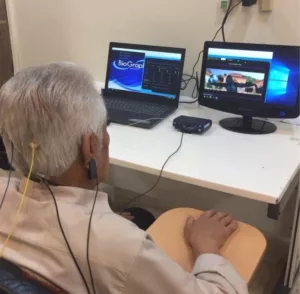
Neurofeedback is one of the safe, alternative therapies the BART Foundation believes may help brain injury survivors. The BART Foundation aims to promote better outcomes for TBI/ABI survivors by answering three questions – Which alternative therapies are likely to work, where can they be found, and how can they be afforded? One of the ways we fulfill our mission is by carefully watching global research and clinical trial outcomes and sharing that information in user-friendly language with the TBI/ABI community.
Cognitive impairment is common in patients with traumatic brain injury (TBI). Studies that have examined the effectiveness of neurofeedback (NFB) on cognitive function following TBI have had poor study designs and small sample sizes. Results of a recent randomized controlled trial that was published in the May 2023 issue of Neurorehabilitation and Neural Repair offer some hope and steps forward for the TBI/ABI community.
The research, which was conducted through several medical schools, universities, and hospitals in Taiwan, assessed the effects of low-resolution tomography Z-score NFB (LZNFB) and theta/beta NFB on cognitive impairment, return to productive activity and quality of life in patients with TBI.
Researchers randomly assigned 87 patients with TBI with cognitive impairment to LZNFB, theta/beta NFB, or usual care (UC) groups. Patients in both NFB groups received weekly 60-minute treatment for 10 weeks, and those in the control group received UC and telephone interviews for 10 weeks. The primary outcome was cognitive function as measured by performance on cognitive tasks; the secondary outcomes included productive activity and quality of life-based on the Community Integration Questionnaire-revised (CIQ-R) and the Quality of Life after Brain Injury (QOLIBRI), respectively, at baseline and immediately after the last intervention.
Results indicated that the LZNFB group exhibited significantly greater improvements in immediate recall, delayed recall, recognition memory, and selective attention compared with the UC group; the theta/beta NFB group exhibited improvements in only immediate memory and selective attention. The total CIQ-R scores of the LZNFB group after treatment were significantly improved than those of the UC group. Visit the National Library of Medicine website to read more and access the full article.
For those wanting more information about neurofeedback, there are a couple of good sources the BART Foundation has reviewed:
The EEG Education and Research
The Biofeedback Certification Institute of America
For LENS neurofeedback, the safest source is Ochs Labs
We also encourage those interested in EEG-based neurofeedback to visit our media page and watch our videos on this topic.